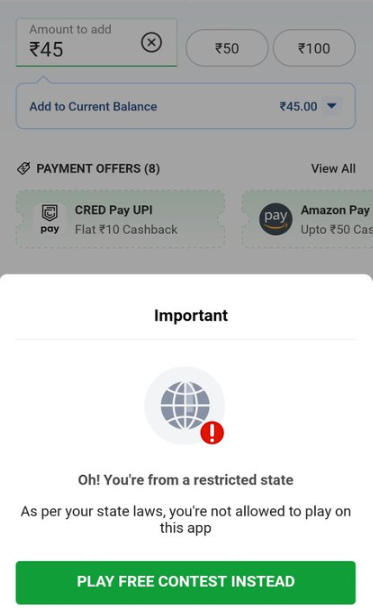Fantasy sports have grown rapidly in India, with Dream11 emerging as one of the country’s most widely used sports platforms during events like IPL 2025. For years, its availability depended heavily on state-wise gaming laws because it offered real-money contests.
That changed in 2025 with the passage of the Promotion and Regulation of Online Gaming Act, which banned real-money online gaming nationwide. As a result, Dream11 has exited paid fantasy contests in India and now operates only as a free-to-play sports entertainment platform.
This article explains how Dream11’s legal status has evolved, which state laws mattered earlier, and what the current rules mean for users across India.
Dream11 State-Wise Status (2026)
| State | Before Gaming Law | After 2025 Gaming Law |
|---|---|---|
| Assam | Banned | Free-to-play allowed |
| Odisha | Banned | Free-to-play allowed |
| Andhra Pradesh | Banned | Free-to-play allowed |
| Telangana | Banned | Free-to-play allowed |
| Nagaland | Restricted | Free-to-play allowed |
| Sikkim | Restricted | Free-to-play allowed |
| Tamil Nadu | Restricted (time & KYC rules) | Free-to-play allowed |
Earlier bans applied only to real-money contests. After the 2025 gaming law, Dream11 now works everywhere in India in free-to-play mode.
Dream11 State-Wise Restrictions Before the Gaming Law

1. Assam
Before the nationwide real-money gaming ban in 2025, Assam took a firm stance against betting and wagering on games or sports, except for horse racing and lotteries. Gambling activities in the state were governed by the Assam Game and Betting Act, 1970, an extension of the Public Gambling Act, 1867, without any exemption for games of skill.
Because Assam law did not differentiate between games of chance and games of skill, all real-money online fantasy sports platforms, including Dream11, were treated as illegal. This interpretation resulted in a complete ban on paid fantasy contests in the state during the pre-2025 period.
2. Odisha
Odisha enforced restrictions on real-money fantasy sports under the Odisha Prevention of Gambling Act, 1955. The law defined gambling broadly as any activity involving the risk of money or valuables on the outcome of a game or event, regardless of whether skill was involved.
Due to this wide definition, real-money fantasy sports platforms like Dream11 were effectively banned in Odisha before 2025, despite arguments that such games required skill and sports knowledge. The act’s exclusion of lotteries further highlighted inconsistencies in how different forms of gaming were regulated in the state.
3. Andhra Pradesh
Before 2025, Andhra Pradesh adopted a strict approach toward online gambling and betting, including real-money fantasy sports. This was rooted in the Andhra Pradesh Gaming Act, 1974, which was amended in 2020 to address online gaming platforms.
The amendment banned any activity involving the staking of money on game outcomes, regardless of whether skill was involved. As a result, Dream11’s paid contests were prohibited in the state during the real-money gaming era.
4. Telangana
Telangana was among the first states to restrict real-money online gaming. In 2017, the state amended the Telangana Gaming Act, 1974, to prohibit online gaming played for monetary stakes.
The decision was driven by concerns over addiction and social harm, particularly among younger users. During this period, Dream11 and similar platforms were not allowed to operate paid fantasy contests in Telangana.
5. Nagaland
Nagaland followed a different regulatory approach by recognising skill-based online games under the Nagaland Prohibition of Gambling and Promotion and Regulation of Online Games of Skill Act, 2015.
While Dream11 was not explicitly banned, the law required gaming platforms to obtain licences and comply with strict regulatory conditions, including KYC and banking rules. These requirements made large-scale operations commercially difficult, and Dream11 chose not to actively offer real-money contests in the state before 2025.
6. Sikkim
Sikkim regulated online gaming through a licensing system that allowed games to be played only within the state and only through approved gaming venues using intranet-based terminals.
Because these conditions did not align with Dream11’s nationwide online model, real-money fantasy contests were effectively unavailable in Sikkim during the pre-2025 period, even though there was no explicit statewide ban.
7. Tamil Nadu
Tamil Nadu permitted real-money fantasy sports but imposed strict regulations. Under its online gaming framework, real-money gaming was not allowed between 12:00 AM and 5:00 AM, and players were required to complete Aadhaar-based KYC.
These rules were upheld by the Madras High Court in June 2025 and applied specifically to real-money play. Users were also subject to limits on playtime and spending as directed by the Tamil Nadu Online Gaming Authority.
Dream11’s New Operating Model After Gaming Law
After the Promotion and Regulation of Online Gaming Act, 2025 came into force, real-money online gaming was banned across India. This meant fantasy sports platforms could no longer offer paid contests, cash winnings, or withdrawals, regardless of whether the game involved skill or chance.

In response, Dream11 exited real-money gaming in India and completely shut down paid fantasy contests. The platform shifted to a free-to-play model, where users can participate in fantasy contests without paying any entry fee or winning money.
Alongside free fantasy games, Dream11 repositioned itself as a sports entertainment and engagement platform. It introduced features such as live match watch-alongs, creator-led streams, real-time reactions, and interactive fan chats. The app now focuses on user engagement, content, and community rather than betting or cash rewards.
Today, Dream11 operates legally across all Indian states as a free-to-play sports platform. Since no money is involved, earlier state-level bans, restrictions, and time limits related to real-money gaming no longer apply to Dream11’s current version.
Online Gaming Law 2025: Latest Update
In August 2025, the Promotion and Regulation of Online Gaming Act, 2025 came into force, introducing a nationwide framework for online gaming in India and ending years of state-wise ambiguity.
Key provisions of the law include:
- A nationwide ban on real-money online gaming, covering fantasy sports, rummy, poker, betting, and any other games involving monetary stakes.
- No distinction between skill and chance, meaning all money-based online games are prohibited, regardless of gameplay mechanics.
- Severe penalties for violations, including imprisonment of up to 3 years or fines up to ₹1 crore for operators, and up to 2 years or ₹50 lakh for promoters, endorsers, or advertisers.
- Blocking of financial transactions, with banks, wallets, and payment intermediaries barred from processing payments linked to real-money gaming platforms.
- Expanded enforcement powers, allowing authorities to investigate digital and physical operations involved in prohibited activities.
The government stated that the law was enacted to address growing concerns around addiction, financial distress, youth exposure, money laundering, tax evasion, and the risks posed by offshore gaming platforms.
Following the implementation of this law, Dream11 exited real-money gaming in India and shut down paid fantasy contests, transitioning to a free-to-play sports entertainment model. As a result, real-money fantasy sports are no longer legal anywhere in India, while free-to-play formats remain permitted.
Also Read:
Conclusion: Dream11’s Legal Status After the Gaming Law
Dream11 remains one of India’s most popular sports platforms, but its role has fundamentally changed after the nationwide ban on real-money online gaming. Paid fantasy contests, cash winnings, and withdrawals are no longer allowed anywhere in the country.
Earlier, states such as Andhra Pradesh, Assam, Odisha, and Telangana had banned real-money fantasy sports, while states like Tamil Nadu imposed time and KYC restrictions. However, since Dream11 now operates only in a free-to-play format, these state-specific restrictions no longer apply in practice.
As of now, Dream11 is legally accessible across all Indian states as a sports entertainment and free fantasy platform. Users can participate in free contests, watch creator-led live streams, and engage with match content without risking money. While gaming regulations may continue to evolve, Dream11’s current model complies with Indian law nationwide.

